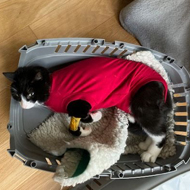
Weaponised attacks on other pets and wildlife are also on the up.
The RSPCA is warning pet owners to be on their guard for incidents of weapon attacks on animals.
It comes in response to new data released by the charity, revealing a stark rise in occurrences involving air gas, catapults and crossbows.
According to the figures, airgun attacks on cats increased 30 per cent in 2024. There were also twice as many catapult incidents reported up to the end of June this year, compared to the same period in 2023.
In total, 497 incidents were reported to the RSPCA between 2022 and 2024, with the highest number occurring in Kent (32), Greater London (31) and Durham (20). However, attacks are taking place across the UK, targeting all kinds of animals.
RSPCA wildlife partnerships manager, Geoff Edmond, said: “Weapon attacks on animals are horrific, but what we see is likely only the tip of the iceberg.
“There’s huge concern about the growing incidents of catapult attacks on wild birds such as swans, but air guns remain by far the most likely weapon to be used on an animal.
“It is unspeakably cruel and totally unacceptable to shoot animals for ‘fun’ - or to harm them for target practice, but sadly we’ve received nearly 500 reports about all kinds of weapon attacks on animals over the past three years.”
To tackle the issue, the RSPCA has launched its Summer Cruelty Appeal to raise awareness of the plight of many animals at this time of year. It is also joining forces with other agencies, including Police forces, to bring about an end to these worrying crimes.
Geoff added: “We are doing all we can to change things. With more and more police forces seeing worrying levels of weapons-related incidents - including those involving young people - we have been helping to develop Operation Lakeshot, a police- and partner-led initiative. This was initially established by Essex Police and the Metropolitan Police, but is now rapidly growing, and aims to tackle these worrying crimes against wildlife.
“We’ve also welcomed Kent Police’s new ‘Catapult Crackdown’ initiative", as they take action to tackle the use of catapults to harm people and wildlife or cause criminal damage”.
Image (C) RSPCA.



 The Federation of Independent Veterinary Practices (FIVP) has announced a third season of its podcast, Practice Matters.
The Federation of Independent Veterinary Practices (FIVP) has announced a third season of its podcast, Practice Matters.